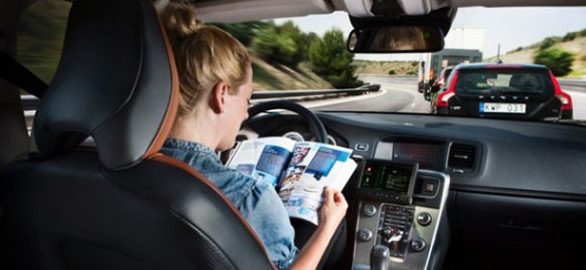With technology advancing at an unrelenting rate, vehicles that were once confined to the sci-fi world are fast becoming a reality. Questions may then be asked as to whether the current legislation that governs this country adequately deals with the potential legal nuances that will inevitably develop once driverless cars are on the road.
Over recent years, we have seen the introduction of vehicles, such as the segway and hoverboard, that have provided an initial period of doubt as to their legality. This is followed by the utilisation of provisions from aged legislation, which were clearly produced with no consideration of these vehicles.
In the case of segways, this was the Highways Act 1835 that prevents the use of footpaths to “lead or drive any horse, ass, sheep, mule, swine, or cattle or carriage of any description”. I very much doubt that Parliament in 1835 was particularly mindful of segways and hoverboards, and yet we now interpret “carriage of any description” to include these modern vehicles.
As we move towards a future where the possibility of autonomous vehicles is becoming a reality, there are already cars on the road that can park themselves and react to the presence of cars or pedestrians around them. Many manufacturers are pushing this to the next step and images are conjured of a world akin to those seen in films like ‘I, Robot’ and ‘Minority Report’.
Defining what driving means
There are multiple Acts of Parliament governing drivers and how they can behave on the roads. Autonomous vehicles raise questions as to whether an occupant of such a vehicle would be considered a driver or a passenger.
Driving, in a legal context, is not easily classified and is usually subjectively considered. The primary test is whether a motorist is “in a substantial sense, controlling the movement and direction of the vehicle”. However, this test is not exhaustive as we must then consider whether the activity in question could fall within the ordinary meaning of the word ‘driving’ in the English language.
Given the subjective interpretations, it is not impossible to conceive that a person could be ‘driving’ simply by setting the navigation system and making the vehicle go because, in essence, you are controlling the movement and direction as required by law.
It would also be necessary to consider whether the ‘driver’ retains any secondary control over the vehicle. Arguably, if there is ever the possibility that a person can take over the controls should they need to, maybe switch it from automatic to manual mode, they would likely be considered at very least ‘in charge’ of the vehicle at any given time.
Can a driverless user be convicted?
If a person was to be considered ‘in charge’ then this could affect criminality in a number of ways. It would mean that a person may not be guilty of a driving offence unless it was one where, by its very nature, being in charge could make them culpable. An example of this would be alcohol and drug-related motoring offences. It is an offence to be drunk or under the influence of drugs in charge of a vehicle, so a person in an autonomous vehicle could still be guilty of this offence, despite the fact that they are not driving.
Practitioners in this area, such as myself, will often argue statutory defence to this particular allegation. This is where a person should not be convicted of an offence if the court accepts that they would not have driven the vehicle until such a time as they were no longer over the limit. This approach is often currently utilised in arguments for motorists who are sleeping in their car whilst intoxicated. The scope of this defence could arguably cover autonomous vehicles, but may be heavily influenced by political and social pressures.
For many, the attraction of an autonomous vehicle would be the possibility of a chauffeur-like service. People could go out with friends, have a drink and get home without the need for expensive taxis or public transport. The allure would disappear, however, if legislation was to be considered in a way that still perceives an occupant of an autonomous vehicle to be a driver or even ‘in charge’ of it. For many, technological advancements can only ever be a good thing but the reaction from a legal perspective, in considering the above examples, seems somewhat draconian.
In other motoring offences, such as speeding, careless driving and dangerous driving, it is pivotal to the offence that the individual is actually driving. If the person was not considered to be actively driving, then there would be arguments to say that they would not be guilty of the offence. This is of course assuming that they have not pre-set the vehicle to drive in a manner capable of amounting to such an offence. This again opens up an avenue to explore legally. If a motorist sets their vehicle to drive in excess of the speed limit, can they be said to be speeding?
Can the law cater for the future?
One suggestion would be to bring allegations for ‘causing’ or ‘aiding and abetting’, which is a substantive offence. This is only one way that could possibly be used to deal with that point, and it would undoubtedly take an already technical area of law to new extremes and overly burden the prosecution to prove positive acts by the individuals.
Another inevitable question may then emerge as to whether a person should remain in such a position to be able to take over and control an autonomous vehicle should it malfunction in any way. An example of a present legal position synonymous to this is where a driving instructor is on a lesson with a student. While it is common knowledge that it would be a criminal offence for the student to be using a mobile phone while driving, it is also an offence if the instructor, during the lesson were to use their mobile phone. This is because it the instructor is expected to pay sufficient attention while instructing and take over if necessary.
If we were then to propose that a malfunction should occur and cause a collision, there would then be questions as to where any fingers of blame should point. Arguably, if it is a technical malfunction, the manufacturer of the vehicle or indeed the relevant software engineer could be culpable. From a civil perspective, this could create duties of care and new insurable risks to such parties.
I, for one, look forward to the development of autonomous vehicles and I am as interested to see how the government propose that they should be regulated. However, it is my hope that a proactive approach is taken to developing legislation as the reactive approach evidenced in recent years could stifle the advancement of these vehicles, having negative impacts on the UK’s development when compared to other major countries.



